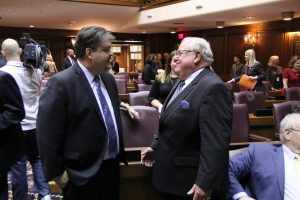Misinformation is a common problem in the modern era. Thanks to the internet and social media, it is easy for information about a variety of issues, including legislation, to be shared quickly and become distorted or inaccurate. It is like a game of telephone. A message can change many times before reaching you. The easiest way to ensure you have correct information is getting it from the original source.
The best place to learn about legislation working its way through the General Assembly is by visiting iga.in.gov. On this website, you can find the exact language of a bill and how it will appear in Indiana code. Committee hearings and session meetings are livestreamed and archived, so you can watch lawmakers discuss different bills and listen to public testimony. If you are passionate about a bill or topic being considered, you can also attend meetings in-person and testify in committee.
If you read something about a bill or the work being done at the Statehouse, I encourage you to consider the source. Without fact-checking, you may only get a small snapshot of a proposal’s impact. Throughout session, groups send out mass emails or alerts, sometimes only sharing half the story in order to rally a large number of people in support or opposition of legislation.
A recent example of this is a bill concerning firearm training for teachers. I received over 100 emails about this legislation. Many constituents had been misinformed about what the proposal would actually do, and were led to believe it would put their children at risk by arming public school teachers. In reality, Indiana law already gives school boards the authority to allow specific teachers or administrators to legally possess a firearm while on school property. The legislation currently being considered would only allow school districts to apply for a grant from the Secured School Safety Grant Program so those choosing and permitted to carry on school property can complete a 40-hour training course.
I am a firm believer in taking the time to learn and understand what it means to carry a firearm. Not only do these courses provide training on how to fire a weapon, but they also teach school faculty how to operate in moments of crisis and great stress, like an active shooter situation.
I support this bill because providing proper training for teachers and school staff who volunteer to carry could add an important layer of protection for Indiana students. Unfortunately due to inaccurate information, a majority of our conversations concerning this bill have been spent dispelling rumors.
In order to prevent this from happening in the future, I recommend reaching out to me directly. I am always available to talk about legislation moving through the process. Before making any decision, I consider all of the feedback I receive from our community. You can contact me to ask questions or voice concerns by calling 317-234-3827, or emailing h58@iga.in.gov. To keep our community informed of the work I’m doing at the Statehouse, I often share updates on different bills being considered through my regular e-newsletter. To sign up to receive these, please visit www.iga.in.gov/h58.
While it may be tempting to take everything you hear or read at face value, it is always best consider the source and research the issue further to get all the facts.





